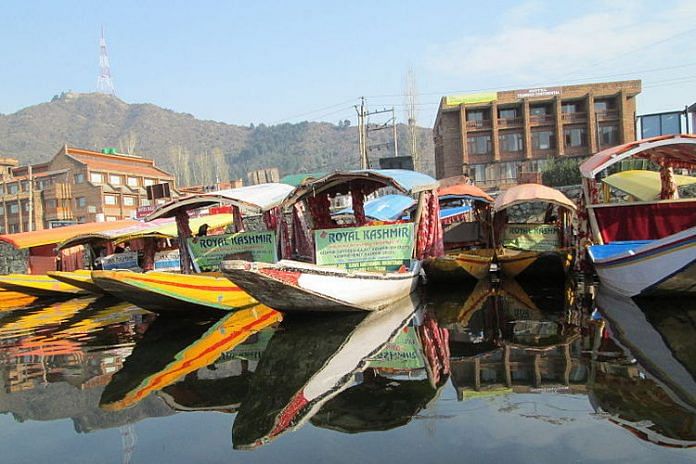With Centre hedging its position on special status, all eyes are on likely SC hearing Tuesday on challenge to Article 370.
The legal sanctity for the special constitutional status enjoyed by Jammu and Kashmir, a political hot potato issue even in the most peaceful of times, could be slowly getting diluted in the Supreme Court of India.
A new debate, started by the Central government on key issues linked to this special status, is for the first time in five decades forcing a re-examination of Articles 370 and 35-A that bestow such a special status on the state.
The contentious issue will likely be back in focus Tuesday as the apex court could hear cases challenging Article 370 at a time the Kashmir Valley has been roiled by violence and political tension.
Article 35-A of the Constitution provides special rights and privileges to “permanent residents” of J&K — a provision which came into effect in 1954 when the President used the powers conferred on him by Article 370 to introduce the ‘Constitution (Application to Jammu and Kashmir) Order 1954’. Article 370 grants autonomous status to the state.
It all began last month during the hearing of a 2014 case challenging the validity of Articles 370 and 35-A. The Centre avoided stating its stand on record, prompting the apex court to refer the case to a larger bench.
The government’s top law officer, Attorney General K.K. Venugopal told the court that a “larger debate is needed on this sensitive issue” and refused to file an affidavit. His submission is in line with the ruling Bharatiya Janata Party’s official stand on the issue.
The trigger though was a December 2016 ruling by the apex court extending the Sarfesi Act to Jammu and Kashmir in spite of the state’s legislature not adopting the law.
The ruling was widely seen as a departure from the special status accorded to the state and was criticized for allowing property belonging to permanent residents of the state to be sold to others for debt recovery.
Eight months on, the J&K government finds itself responding to two separate pleas before the apex court challenging Article 35-A of the Constitution that grants special rights to permanent residents of the state for holding property, government jobs etc.
On 18 July, Chief Justice J.S. Khehar referred the 2014 plea filed by ‘We the Citizens’, a Delhi based non-profit, to a three-judge bench and hinted that the case could be heard by a larger constitution bench later.
Two weeks back, a separate bench headed by Justice Dipak Misra, the next chief justice admitted the second plea on similar lines. The cases are likely to be tagged and heard together.
The court’s decision to revisit the law on Article 35A has already triggered criticism from experts and also from chief minister Mehbooba Mufti and the National Conference’s Omar Abdullah.
Faizan Mustafa, Vice-Chancellor of Nalsar University of Law, Hyderabad, points out that other states such as Himachal Pradesh and those in the northeast also prohibit non-locals from buying land. “The courts must not allow anyone to unnecessarily rake up issues,” he said.
The law on the controversial special status to Jammu and Kashmir is considered settled and a few pleas to review the same have been dismissed by the court. Two constitution benches in 1961 and 1969 upheld the validity of Article 370.
Also, the Delhi High Court last year dismissed yet another plea challenging Article 370 and clarified that the law on the issue is well settled by the apex court. The Centre and the state government had called the petition “lacking in substance” and defended the law.
Even the Supreme Court dismissed public interest litigation cases challenging Article 370 in 2014 and 2015, saying that only Parliament can deliberate on this issue. But some other recent rulings raised the hackles of Kashmiris as they were seen as departures.
In a landmark case that changed the status of special laws in J&K, a five-judge constitution bench headed by then chief justice T.S. Thakur last year ruled that it can transfer cases from the jurisdiction of Jammu and Kashmir High Court to any other court in India.
The central government had backed the apex court saying that irrespective of the special laws, the state’s own constitution, civil procedure code and penal code, cases arising from J&K can be transferred to any part of India.
The apex court has also intervened in another politically sensitive public interest litigation case filed by a Jammu and Kashmir based advocate Ankur Sharma.
Last month, it directed the state government to consider setting up a minority commission for Hindus in the state with over 60 per cent Muslim population. “This is a very important issue. Given how things have emerged, protection has to be extended to the minority in the state,” the chief justice had said.
However, many states including Haryana, Himachal Pradesh, Goa, Gujarat do not have a special minority commission.
“It is reasonable to expect the court to follow a pattern and decide cases based on settled points of law. They can’t go cherry picking cases to develop new legal aspects,” Mustafa said.



